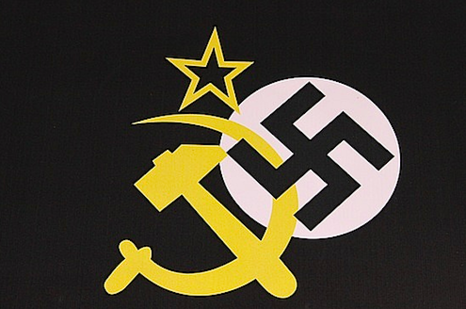 With the recent Lithuanian elections barely out of the way, and the ruling right-wing Homeland Union Conservatives the undisputed losers, the ultranationalist right is losing no time in pressing ahead aggressively with the Double Genocide “red-equals-brown” agenda, reverting to one of the movement’s original slogans: “United Europe — United History.” For pro-tolerance and liberal forces, the profoundly undemocratic message implied is that a united Europe has to also be united (i.e. have one opinion) on questions of history, and that Double Genocide and its central document, the 2008 Prague Declaration, are inviolable truths.
With the recent Lithuanian elections barely out of the way, and the ruling right-wing Homeland Union Conservatives the undisputed losers, the ultranationalist right is losing no time in pressing ahead aggressively with the Double Genocide “red-equals-brown” agenda, reverting to one of the movement’s original slogans: “United Europe — United History.” For pro-tolerance and liberal forces, the profoundly undemocratic message implied is that a united Europe has to also be united (i.e. have one opinion) on questions of history, and that Double Genocide and its central document, the 2008 Prague Declaration, are inviolable truths.
In June 2010 Lithuania passed a law criminalizing dissent from this view, following in short order the passage of a similar law in Hungary when the right-wing Fidesz party came to power there. The law was condemned by Lithuania’s Jewish community newspaper, and has led to robust discussion.
The Prague Declaration has repeatedly been decried by Holocaust survivors, their advocates, scholars and public figures. In 2012, it was seriously challenged for the first time in the European Parliament by release of the Seventy Years Declaration (SYD), signed by 71 parliamentarians from across the EU. The SYD, attacked by Lithuania’s foreign minister in his infamous “moustache comparison,” and the subject of much debate, has been the focus of an Australian documentary film, a New York Times report by Roger Cohen, and was last March formally presented to the president of the European Parliament.
The “United Europe — United History” conference will be held on 15 and 16 November in Lithuania’s parliament, underlining the status it is being accorded. The conference program in Lithuanian is available here, in Bernardinai.lt and on the parliament’s own website (though as of today only on its Lithuanian, and not on its English page…) A description in English is available on the website of the “Red-Brown Commission” along with the conference program in English (also available here).
The program features the outgoing prime minister, Andrius Kubilius, and as ever, the “Jewish parliamentarian” Emanuelis Zingeris, who was the only Jew in Europe to sign the Prague Declaration. Last spring, the PM personally signed off on the budget to repatriate the remains and rebury with full honors and amidst multiple ceremonies the 1941 Nazi puppet prime minister who personally signed the order confirming German instructions to remove all the Jews of Kaunas from their homes to a ghetto within one month.
This was taken as further demonstration of the inherent linkage between Double Genocide thought and the state-sponsored efforts to glorify local Holocaust perpetrators and collaborators as “anti-Soviet heroes.” Protests came, among others, from the country’s small Jewish community, two members of the Social Democratic Party, three members of the US Congress, the Simon Wiesenthal Center’s Dr. Efraim Zuroff, and an international petition, since recalibrated to oppose memorials to Holocaust collaborators.

From the emailed conference announcement, it is evident that the Red-Brown Commission (formally: The International Commission for the Evaluation of the Crimes of the Nazi and Soviet Occupation Regimes in Lithuania) is the event’s actual organizer. It therefore implicates in Double Genocide the possibly naive foreign partners who recently joined or rejoined the Commission, including Yad Vashem in Jerusalem. Despite the repeated protests of Holocaust survivors and their supporters, the American Embassy in Vilnius, in a move said to cause anguish to the Survivor community, issued a statement supporting the commission’s relaunch. In contrast to the robust statement by American congressmen, the embassy has been taken to task for going along with Lithuania’s campaign for Double Genocide.
The Commission’s executive director, a prominent participant in next week’s conference, has in a 2011 speech at Lithuania’s parliament and in an on-the-record 2012 interview denied the early murderous violence of the Lithuanian Activist Front (LAF) and other fascist organizations who unleashed murder of Jewish neighbors in dozens of locations in Lithuania before the arrival of German forces. He ties his denials to charges of Jewish communism as a factor invoked to mitigate the barbarous murders of Jewish civilians by the LAF which had in fact published its intentions regarding the country’s Jewish citizens in leaflets distributed before the start of the war.
Among those who have publicly resigned on principle in earlier years from the Commission and its associated committees of experts, principally over the Commission’s failure to publicly condemn the defamation by state prosecutors of Holocaust survivors who joined the anti-Nazi resistance, are Sir Martin Gilbert (London), Prof. Gershon Greenberg (Washington, DC), Prof. Konrad Kwiet (Sydney) and Prof. Dov Levin (Jerusalem).
Other partners of the forthcoming November 2012 conference in Vilnius include the Genocide Center, which continues to have a Nazi march organizer on its staff and whose affiliated institutions include antisemitic material (at the Genocide Museum, Gruto parkas, and on its own website). Recently, even the state-sponsored Jewish Museum issued (for the first time) a public statement explaining its refusal to appear at one meeting with the Genocide Center’s representatives. This was reported in the London Jewish News.
But for the Double Genocide movement in Vilnius and its prime engine, the Red-Brown Commission, it can seem daily practice to join forces with and thereby legitimize the most antisemitic and Holocaust-revisionist of the country’s institutions.
The conference features not a single lecture offering a clearly opposing point of view. Its participants include prominent personalities from one side of the argument. Among them: MEP Landsbergis, author of a recent book sanitizing and glorifying the 1941 Nazi puppet government (last spring he berated colleagues who protested the reburial of the puppet PM); Professor K. Girnius, a staunch “partial sanitizer” of the same 1941 government (see replies by Donskis and Vasiliauskaitė); Professor S. Liekis, director of the Vilnius Yiddish [!] Institute who told the Economist last year that a Litvak protest letter was one of “two Talibans” (the other being the antisemitic establishment in the country).
“United Europe — United History” was in fact the original name of the January 2008 conclave in Tallinn that served as precursor to the Prague Declaration (and various of that event’s leaders are precisely the same folks coming to town for the Vilnius conference next week). British human rights champion MP John Mann rose in the House of Commons on 31 January 2008 to explain to the British Parliament what it was all about:
“On 22 January, in Tallinn, Estonia, five MEPs from five different countries met to launch a group called Common Europe—Common History. It has the same theme—the need for an equal evaluation of history.
It is just a traditional form of prejudice, rewritten in a modern context. In essence, it is trying to equate communism and Judaism as one conspiracy and rewrite history from a nationalist point of view. Those are elected MEPs.”
John Mann MP is the chairman of the UK’s All-Party Parliamentary Group against Antisemitism.